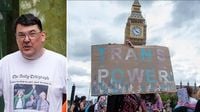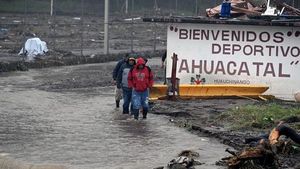Free speech, long considered a cornerstone of democratic societies, is facing one of its most contentious periods in modern Britain. Recent high-profile arrests, mounting government scrutiny, and the chilling effect on artistic expression have thrown the debate into sharp relief, raising urgent questions about the future of open discourse in the UK.
At the center of this storm stands Graham Linehan, the Irish comedy writer famous for creating Father Ted and The IT Crowd. On September 21, 2025, Linehan warned in a televised interview that satire is "dying," claiming he would not be allowed to make a show like Father Ted today. His comments followed a dramatic arrest at Heathrow Airport by five armed police officers, who detained him on suspicion of inciting violence through three tweets posted in April while he was living in the United States.
Linehan’s tweets, which he shared publicly, included a controversial suggestion to "punch [a trans woman] in the balls" if encountered in a female-only space. He also posted an aerial shot from a trans demonstration, describing it as "a photo you can smell," and followed up with, "I hate them. Misogynists and homophobes. F*** em." According to The Week, Linehan was arrested for inciting violence, sparking cabinet-level debate over the boundaries of free speech and the policing of online communications.
In the aftermath, Health Secretary Wes Streeting weighed in, stating, "We want to see people being kept safe by policing streets, not just policing tweets." Streeting’s remarks echoed a growing consensus that the UK’s speech laws, especially concerning online activity, may require urgent review to ensure they reflect "the priorities of the public."
Linehan, 57, has since relocated to Scottsdale, Arizona, describing it as a "free speech enclave." He cited a stifling creative atmosphere in the UK, blaming TV executives and what he called "a thousand people looking over your shoulder"—a reference to the pressure from minority groups and heightened sensitivity around humor. "It would be impossible to do a comedy like Father Ted or The IT Crowd now," Linehan told Sky News. "The feeling of a thousand people looking over your shoulder as you write would be intolerable." He argued that comedy, by its nature, targets everyone’s flaws and humanity, but that the current climate makes it impossible to create anything truly interesting or boundary-pushing.
His experience is not isolated. In 2024, Lucy Connolly was convicted for inciting racial hatred after tweeting, in the wake of the Southport killings, that people should set fire to hotels housing asylum seekers. She received a sentence of two years and seven months—a punishment that has sparked heated debate over proportionality and the limits of online speech.
Britain’s legal framework regarding speech has evolved over centuries. The 1275 English law criminalized the publication of false news or tales, and for much of history, blasphemy, heresy, and defamation were severely punished. The modern concept of secular free speech dates to the 1720s with Cato’s Letters, which influenced both European and American thought. The US First Amendment, adopted in 1791, took an absolutist stance, sharply contrasting with Europe’s more qualified approach. In Britain, freedom of speech in Parliament was enshrined by the 1689 Bill of Rights, but broad public protections only arrived with the Human Rights Act of 1998, which incorporated Article 10 of the European Convention on Human Rights. This article guarantees "the right to freedom of expression," but allows for restrictions and penalties.
Today, the UK’s main exceptions to free speech include incitement to crime or hatred, threats, defamation, terrorism, fraud, obscenity, child pornography, and contempt of court. Yet, as The Week reports, the list of exceptions is even longer in practice, especially after the rise of digital communication. The 2003 Communications Act made it illegal to send "grossly offensive" or indecent messages, resulting in more than 12,000 arrests in England and Wales in 2023 alone. The recently enacted Online Safety Act has drawn criticism for its vague language, criminalizing offenses such as sending a "false" communication intending to cause "non-trivial harm." By early 2025, 292 people had been charged under this law.
Police forces now also log "non-crime hate incidents"—expressions of perceived hostility towards vulnerable groups that do not meet the threshold for a hate crime. Critics argue that this practice, along with the proliferation of speech-related offenses, risks stifling legitimate expression and encouraging self-censorship.
Free speech concerns extend far beyond the digital realm. The 2023 Public Order Act imposed extensive bans and controls on certain forms of protest, leading to the arrest of hundreds of Palestine Action supporters merely for expressing solidarity with the proscribed group. Such measures, say civil liberties groups, threaten the right to dissent and protest—core components of a healthy democracy.
Linehan’s arrest has reignited debate about the role of satire and comedy in society. Reflecting on the past, he lamented, "Imagine [boundary-breaking shows like Brass Eye] being made. It is impossible to imagine that they made them. And so we’re going backwards. We’re going backwards. We’re not moving forwards." He described a "creeping unease" about living in the UK and said his arrest was "unexpected but excepted at the same time." He added, "I never thought anyone would be so offended by them," referring to his tweets.
Internationally, the issue of free speech is no less fraught. In the United States, late-night host Jimmy Kimmel was briefly taken off air by ABC after making jokes about President Trump’s reaction to the death of right-wing influencer Charlie Kirk. Trump threatened to revoke network licenses over perceived negative coverage, prompting fellow host Stephen Colbert to call Kimmel’s suspension a "blatant assault on freedom of speech." Linehan, when asked about the Kimmel incident, remarked, "I certainly don’t think that the Trump administration should be influencing decisions made by TV companies. That’s definitely not on."
Meanwhile, Linehan faces additional legal troubles in the UK. He is currently on trial at Westminster Magistrates’ Court, accused of harassing transgender woman Sophia Brooks by posting abusive comments on social media and damaging her phone. Linehan has pleaded not guilty and is out on bail, with the case adjourned until October 29.
The debate over free speech in Britain is deeply polarized. Advocates on all sides seem to support the kinds of speech they prefer—Nigel Farage, for instance, defended Lucy Connolly but called for crackdowns on pro-Palestine protests. Donald Trump champions free speech yet sues major newspapers for billions. As the government signals a willingness to revisit and potentially reform the country’s patchwork of speech laws, the challenge will be to strike a balance between protecting individuals from harm and preserving the robust exchange of ideas that underpins an open society.
For now, Britain stands at a crossroads, with the future of free speech—and the boundaries of comedy, protest, and dissent—hanging in the balance.





